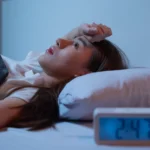Identifying Co-occurring Disorders
Depression often doesn’t walk alone. It can come hand in hand with other mental health conditions, creating a complex web that can be challenging to untangle. Let’s delve into some of the co-occurring disorders that often accompany depression: anxiety, bipolar disorder, and substance abuse.
Anxiety Disorder
Anxiety is a frequent companion to depression. The co-occurrence of these two conditions often leads to more severe and persistent symptoms, requiring a more complex treatment approach.
The overlap between anxiety and depression can contribute to the ‘empty’ mood often reported by those affected. It’s not just about feeling anxious or worried; it’s about feeling a profound sense of despair that can be debilitating.
Bipolar Disorder
Bipolar disorder, also known as manic depression, is characterized by alternating periods of depressive lows and manic highs. Accurate diagnosis is crucial to differentiate it from other conditions like seasonal affective disorder and ensure the appropriate treatment is provided.
While depressive episodes in bipolar disorder mirror the symptoms of clinical depression, manic episodes are defined by abnormally elevated, expansive, or irritable moods accompanied by increased activity. Recognizing these manic highs is key to identifying bipolar disorder and initiating effective treatment.
Substance Abuse
Substance abuse is another condition that often co-occurs with depression. In fact, up to one-third of individuals with depression also struggle with some form of substance abuse or dependence.
The relationship between depression and substance abuse is complex. Depression can lead to substance abuse as a form of self-medication, and vice versa, substance abuse can trigger or exacerbate depressive symptoms.
Seeking Help: When and Where to Find Support
Recognizing the signs of depression is the first step. But how do we move from acknowledgement to action? Seeking help involves recognizing the need for support, finding the appropriate mental health services, and knowing when to seek treatment or emergency assistance.
Recognizing the Need for Help
Knowing when to seek help is crucial. If depression symptoms persist for at least two weeks and interfere with daily activities, it is advisable to seek professional help.
Depression is often missed in primary care settings, potentially delaying appropriate treatment. Therefore, it’s important to be proactive and vocal about your mental health concerns with your healthcare provider.
Finding Mental Health Services
Once the need for help is recognized, the next step is to find the right mental health services. Many resources are available, from national organizations to state and county agencies, and even universities and colleges, where you can find a mental health professional.
Services such as the Substance Abuse and Mental Health Services Administration (SAMHSA) and Mental Health America offer resources to locate mental health services. In addition, the National Institute of Mental Health provides guidelines for selecting appropriate mental health care providers and services.
Emergency Situations
In a mental health crisis, immediate help is available. If you or a loved one is experiencing suicidal thoughts, call or text the crisis hotline at 988. This helpline can provide immediate support through calls, texts, or online chats.
In situations where someone is at risk of self harm or attempting suicide, it’s crucial to call 911 or your local emergency number immediately. Remember, you’re not alone. There’s always help available.
Treatment Options for Depression
Once we recognize depression and seek help, what next? The good news is there are multiple treatment options for depression, including antidepressant medications, talk therapy, and lifestyle changes.
Let’s explore these further.
Antidepressant Medications
Antidepressant medications play a significant role in managing and alleviating depression symptoms. These medications, which include:
- Selective serotonin reuptake inhibitors (SSRIs)
- Serotonin-norepinephrine reuptake inhibitors (SNRIs)
- Tricyclic antidepressants (TCAs)
- Monoamine oxidase inhibitors (MAOIs)
- Atypical antidepressants
Treatment can be most effective for moderate, severe depression, and major depression, as well as chronic depression.
Finding the right antidepressant may involve trying several medications or combinations, considering family treatment history, and possibly genetic testing. While the process can be challenging, it’s a crucial step towards managing depression.
Talk Therapy
Talk therapy, or psychotherapy, is another effective treatment option for depression. Techniques such as cognitive-behavioral therapy (CBT) and interpersonal therapy (IPT) can help address negative patterns of thought and behavior.
CBT focuses on addressing negative thought patterns, while IPT aims to improve personal relationships that may be contributing to an individual’s depression.
Therapy can provide a safe space to:
- explore feelings
- explore thoughts
- explore behaviors
- develop coping strategies.
Lifestyle Changes and Self-Care
Along with medication and therapy, certain lifestyle changes and self-care practices can play a significant role in managing depression. Regular exercise, for instance, can help alleviate symptoms and improve mood.
Getting adequate sleep is also crucial for managing depression symptoms. Furthermore, having a strong social support network can provide emotional assistance and a sense of community, which can be invaluable in the battle against depression.
Depression is a complex condition that affects millions of people worldwide. Recognizing its signs and symptoms across emotional, behavioral, and physical dimensions is crucial. Understanding how depression manifests in different age groups and alongside co-occurring disorders can help in its early detection and treatment. Remember, there’s no shame in seeking help, and with the right support and treatment, it’s entirely possible to manage depression and lead a fulfilling life.
Frequently Asked Questions
What are some emotional indicators of depression?
Some emotional indicators of depression include persistent feelings of sadness, emptiness, irritability, restlessness, and frustration. If you experience these feelings, it may be a sign of depression.
How does depression manifest differently across age groups?
Depression can manifest differently across age groups, with symptoms varying from school avoidance and constant worries in children to problems at work or school in adults, and less obvious or different symptoms in older adults. It’s important to be aware of these differences to provide proper support and understanding for individuals experiencing depression.
What co-occurring disorders often accompany depression?
Depression is often accompanied by anxiety, bipolar disorder, and substance abuse. These conditions frequently co-occur with depression.
What are some treatment options for depression?
Some treatment options for depression include antidepressant medications, talk therapy, and lifestyle changes like regular exercise and maintaining a strong social support network. It’s important to discuss these options with a healthcare professional to determine the best approach for you.







